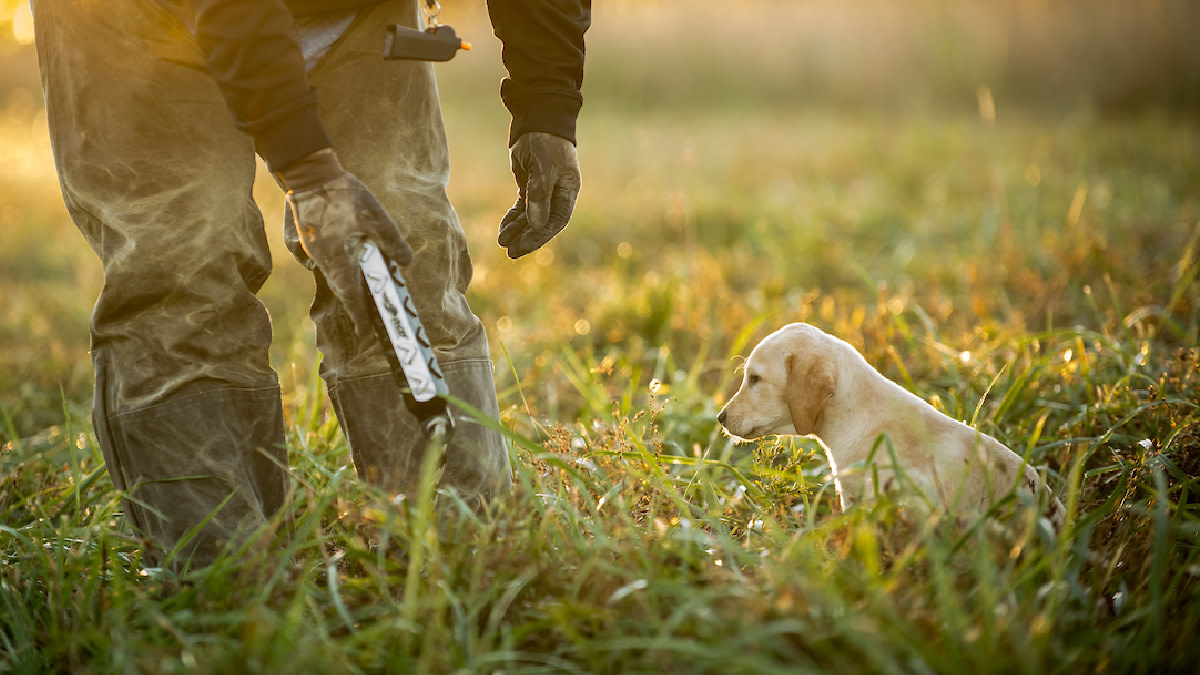Hunting Dog Training: Hire a Professional or DIY?

Nobody wants their dog to be poorly trained. We all want our dog, couch potato or duck-fetching machine, to be a “good boy” or else we wouldn’t ask them if they are all the time. Yet countless dogs across the country end up with bad manners and lackluster abilities in the field. So it begs the question; should you hire a professional or do it yourself?
Barton Ramsey and Ethan Pippitt are two of the most qualified guys out there to discuss this topic. They're both professional dog trainers but also have DIY training programs that are top-notch resources for those who don’t want to pay a trainer.
DIY Training Pros and Cons
Barton Ramsey, the founder of Southern Oak Kennels and a partner inCornerstone Gundog Academy, thinks neither option is better than the other. It’s just about what’s best for the dog.
“DIY training is going to require quite a bit of resources, beyond just time,” Ramsey said. “You need land access, training equipment, time, and most importantly the knowledge and skills of how to train your dog. Not everyone has access to those things, and if you don’t, the most fair thing for the dog is paying for professional training.”
Ethan Pippitt of Standing Stone Kennels trains professionally, has training videos onYouTube, and is a big believer in DIY if you have the resources.
“I’m a huge advocate for people training their own dogs, because the relationship-building that happens there is unmatched by anything else,” Pippitt said. “You need access to birds, land, a place to shoot guns, and time 3-4 days a week to allocate to hard training. If you don’t have those, you need to look at hiring a professional trainer.”
Ramsey also sees the DIY route as an opportunity to deeply immerse yourself in waterfowling.
“The benefits of doing your own training are that you develop a really cool relationship and you learn a new skill along with your dog,” Ramsey said. “You extend your waterfowl hobby to year-round, and hunting with a trained dog that you trained yourself can be the most rewarding part of the hunt.”
But, if you don’t have the resources, you don’t have them. So you choose the professional trainer. What next?
Hiring A Professional
Pippitt laid out some questions and important talking points when you’re looking for a trainer:
Communication is huge. Can you get ahold of them?
Do you feel comfortable with that trainer as a person? If your gut doesn’t trust that person, there’s probably a reason why.
Ask them what kind of experience they have.
Ask about how they let dogs out, how the dogs are kenneled, and ask to see the facilities. Make sure they have a clean, healthy facility and environment where the dog will be housed.
What does the hand-off after training look like? You want them to spend as much time as you need to learn all that information from the trainer of what the dog knows, commands, and behaviors. It takes time to transfer that knowledge to the owner of how and what the dog is capable of.
What’s their minimum time with the dog?
Knowledge is Power
But, both Ramsey and Pippitt said that hiring a professional trainer isn’t the end all be all. You have to have some training knowledge and dog-handling abilities yourself.
“Cornerstone Gundog Academy has a lot of clients who send their dogs to professional training, but then know how to handle the dog properly when the dog is home,” Ramsey said. “You have to make time to maintain the training of the dog, even if you send them to a professional. They’re not robots, and they’ll regress in their training if you don’t continue working with them.”
I couldn’t agree more with Barton. Having now completely trained my own dog for a full year, even a week without focusing on a certain behavior, likeplace, can show a diminishing sharpness.
“I think DIY training programs are extremely valuable to everyone, even if you go the professional route,” Ramsey said. “You can’t expect a professionally trained dog to sit on the couch eating Cheetos all summer and be a machine when hunting season gets here. You need to have the knowledge to learn and maintain along with your dog.”
My Experience
These two fellas perfectly nailed my experience over the last year with my pup, Kace. It’s been very rewarding to teach her everything she knows, and we’re best friends. But land access, resources, and time have been a point of stress more than I’d hoped. I’m happy I made the commitment, though, to working hard and spending so much time with my dog, in hopes that we both can enjoy all that duck season has to offer and not be worried about lack of training.
Shop
Sign In or Create a Free Account
Related
Hunting with Dogs
How to Waste Money By Having Your Hunting Dog Professionally Trained
Hunting with Dogs
How to Suck Less at Training Your Dog


